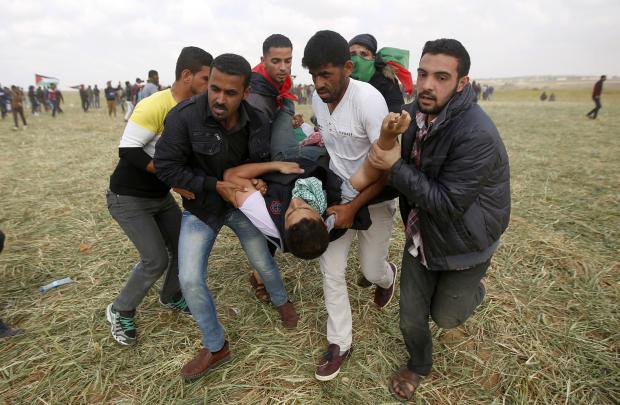
Palestinian protesters evacuate a wounded youth during clashes with Israeli troops along the Gaza Strip border with Israel, east of Khan Younis, Gaza Strip, Friday, March 30, 2018. (Photo by ADEL HANA / AP)
GAZA CITY, Gaza Strip — Israel will target “terror organizations” in Gaza if violence along the territory’s border with Israel drags on, the chief military spokesman warned Saturday, a day after thousands of Palestinians staged protests near the border fence.
The mass marches were led by Gaza’s ruling Hamas group and touted as the launch of a six-week-long protest campaign. Palestinian health officials said 15 Palestinians were killed by Israeli fire and more than 750 hit by live rounds, making it the bloodiest day in Gaza since the 2014 cross-border war between Israel and Hamas.
In Friday’s confrontations, large crowds gathered near the border fence, with smaller groups of protesters rushing forward, throwing stones and burning tires.
Israeli troops responded with live fire and rubber-coated steel pellets, while drones dropped tear gas from above. The army released video showing soldiers with rifles perched on high earthen embankments overlooking the scene.
Brig. Gen. Ronen Manelis, the chief army spokesman, denied allegations of excessive use of force, saying those killed by Israeli troops were men between the ages of 18 and 30 who were involved in violence and belonged to militant factions.
He alleged Gaza health officials exaggerated the number of those wounded, and that several dozen at most were injured by live fire while the rest were merely shaken up by tear gas and other riot dispersal means.
Gaza City’s Shifa Hospital received 284 injured people Friday, the majority with bullet injuries, said spokesman Ayman Sahbani. He said 70 were under the age of 18 and 11 were women.
He said 40 surgeries were performed Friday and that 50 were planned Saturday. “These are all from live bullets that broke limbs or caused deep, open wounds with damage to nerves and veins,” he said.
Among those recovering from surgery was 16-year-old Marwan Yassin who had thrown stones with a slingshot at the fence Friday and was shot in both legs. One of his legs was wrapped in bandages and the other had a cast and metal fixtures.
His mother said at his bedside that she would ban him from future protests.
On Saturday, a few hundred people gathered at five tent encampments that have been set up several hundred meters from the border fence. The tents serve as the launch points for marches.
Protest organizers have said mass marches would continue until May 15, the 70th anniversary of Israel’s creation. Palestinians mark that date as their “nakba,” or catastrophe, when hundreds of thousands were uprooted during the 1948 war over Israel’s creation. The vast majority of Gaza’s 2 million people are descendants of Palestinians who fled or were driven from homes in what is now Israel.
Manelis reiterated Saturday that Israel “will not allow a massive breach of the fence into Israeli territory.”
He said that Hamas and other Gaza militant groups are using protests as a cover for staging attacks. If violence continues, “we will not be able to continue limiting our activity to the fence area and will act against these terror organizations in other places too,” he said.
The border protests were seen as a new attempt by Hamas to break the border blockade, imposed by Israel and Egypt after the Islamic militant group seized Gaza from forces loyal to its rival, Palestinian President Mahmoud Abbas, in 2007. The continued closure has made it increasingly difficult for Hamas to govern.
The large turnout of marchers in the dangerous border zone also seemed to signal desperation among Gaza residents. Life in the coastal strip has deteriorated further in recent months, with rising unemployment, grinding poverty and daily blackouts that last for hours.
The protest campaign is also meant to spotlight Palestinian demands for a “right of return” to what is now Israel.
The prospect of more protests and Palestinian casualties in coming weeks could also place Israel on the defensive.
At the United Nations, Secretary-General Antonio Guterres called for an independent investigation, while Security Council members urged restraint on both sides. The council didn’t decide on any action or joint message after an emergency meeting Friday evening.
Abbas, the West Bank-based leader, renewed a call for international protection of Palestinians.
In the West Bank, shopkeepers observed a commercial strike called by political activists Saturday to protest Israel’s response to the Gaza marches.